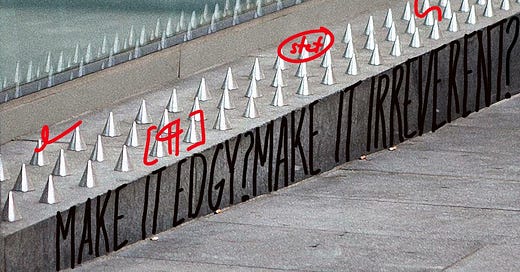Note: Don’t like reading? The Podcast audio is at the end of the story.🫡
I like your spikes. I particularly like how you installed them on top of your walls that cannot be scaled. What’s that? Oh, you’re still waiting on the cauldrons of burning oil to round out the look. Neat! (Though personally, I’d be worried about the stench.) Your benches are cool too—like super-futuristic with a modernist slant. Sorry, what’s that? NOT a modernist slant. Oh, I beg your pardon. The slant is to stop people laying down and getting too comfortable around you. Gotcha. Must be that new “Fortress Aesthetic” I’ve heard so much about.
Hot take: we are victims of our hostile architectures. The defenses we construct to protect our fragile egos from feedback’s foot soldiers don’t do us any favors. They block the true expansion of our potential. It’s no good having a creative heart if it’s locked forever at the top of a castle, behind walls with impenetrable gates and a bollard forest at the door. It might be a happy heart, but it ain’t ever gonna discover its capacity for true growth.
Your creative estate—the square footage of your ideas and executions—is sacred ground. I get it. But if you want to push the boundaries of this estate outwards over the course of a creative lifetime, you’ve got to let the appraisers in occasionally. Yes, they’ll be total hooligans. They’re going to skate all over your pretty promenade, grinding their boards on your benches while ignoring all your “No skating” signs, and your CCTV won’t be able to do one thing about it.
“But I had a moat!” you’ll cry. Yes, I know. You showed me the piranhas and I asked if they were more effective than crocodiles, remember?
Listen, and I’ll say this to anyone who’s about to sit down to a creative review of their concepts, design, copy, or whatever.1 Listen. Feedback is not always criticism. It doesn’t always need to be defended against. What it does need to be is absorbed and processed. Listen. Feedback is a direct assault on ego. It can be uncomfortable and rage-inducing and hurt like a mofo as you sit in that review, blood rushing to your face with the tsunami of disappointment drowning your confidence. “Someone doesn’t like this thing I made? How is this even bloody possible?!” Listen.
I mean LITERALLY listen to the feedback you are receiving from whomever is your creative guide in the room. Separate yourself from your pride for just a moment. What are they actually saying? This feedback giver—do you trust them? Should you trust them? Do they have more experience? Are they the keeper of the vision? Do they know more than you? What’s their gut like? Do you disagree with their opinion?
Sidebar: Even if you know you won’t win, you should fight for your work2. The act of defending by using passionate argument rather than stone walls helps you learn to talk through your own creative process. It shows those who have your career in their hands that you know how to think and have considered the brief. That said, you must also recognize the “Yield Moment” when you’ve just gotta take that feedback lance straight to the body, apply a bandage, take some good ol’ antibiotics, and get back to work.
But listen. You can agree or disagree, but you cannot formulate your reaction until you fully absorb the wicked kick-flip they just did off your architecture. And that’s how to process feedback.
A word on the shitheels who skate on your surfaces and scuff your architecture for no good reason other than they can. There’s a saying and it goes something like this: “Don’t accept criticism from someone you wouldn’t take advice from.” I’m not saying don’t accept their feedback—you’re being paid to—but don’t take on that emotional baggage that comes with it. There’s no shortage of fail-up-erer’s in the creative space and you’ll come across people you have to listen to who you won’t respect. You know, those seagulls who come into the room, shit on everything, and leave having contributed no solutions or usable direction.
Those people don’t care about your architecture. They don’t care about making you better. They only find joy in power and leaving you to clean up the mess. You will never learn a thing from them—except how to be a bad manager—but never lose sight of your professionalism. You’re going to have to work out how to live in their cruel village with your sensitive façade and still get your work done.3 Do not, under any circumstances, lose sleep over shitty people like this.
I have been blessed with some great creative directors and mentors in my life. I’ve watched in awe as they’ve torn apart my work and marveled at how they’ve helped me make it stronger and more bulletproof, not by telling me what to do exactly, but by pushing me and giving me space to find another way. The unexpected solution lives in the gap between hurt and failure—something you’ll never learn if you hide behind your hostile, feedback-fending, architecture.
I’m not advocating for the destruction of personal armor, but for the correct application of defense strategies that allow you to become as bulletproof as your work—something that will only happen by suffering through and learning from feedback. You must “Indy, cover your heart!” at all times, but leave your mind open to receive, process, and react. Hostile architecture is anti-human. Let those feedback foot soldiers in and leave them to ollie and skate free. Let them sit too close and stay too long. Let them stretch out on your work and loiter in your comfort zone until you are inspired by them to make shit better.
Only then will you become an open, vibrant space in this brutalist world.
Yours in tiny thought,
Janeen
This week’s amends…
I don’t have a particular problem with Charles Bukowski, other than I think his poetry sucks. He once said, poetry was "like taking a shit, you smell it and then flush it away ... writing is all about leaving behind as much a stink as possible", which is all very well, except I think he was applying this to all poetry when he should have been applying it to his own poetry exclusively. His poems are indeed do-do — silly shit — and cloyingly sentimental about his own place in a world he held in absolute contempt. His is a particular view of humanity as abjection which I find difficult to stomach, especially in poetry, beautiful poetry, lover of life and the world that I am.
- Nick Cave
Coming in hot! This is Nick’s answer to this week’s Red Hand Files question on why he said in an interview that people should stop reading Bukowski. There are a couple of Bukowski’s poems that I read out during my SIP Poetry Readings4 that made me like him (I used to roll my eyes whenever someone — usually a boy — would rave about him. I guess I’m what you’d call a surface Bukowski person, float up there and ignoring the ripples.
Eh, whatever your opinion, I still say like what you like. You can’t take “So you want to be a writer” away from me.
In which Elton scores the music to an oven manual5. The lyrics are not up to Bernie Taupin’s standards, but very educational. Side note: what an interesting collection of people in the crowd.
Via Austin Kleon
My word this is good.
And if you're thinking stop motioning sand would be pretty labor-intensive, you’d be right. Watch a little behind the scenes on sand manipulation, here.
Via This is Colossal
Nope.
“A tourist attraction of two giant statues “blowing” flying kisses in southwestern China’s Chongqing has gone viral online. The statues are of a man and women each holding a rotating observation deck on a 1,000 meters-high cliff, for visitors to enjoy the scenery from. When the statues rise to their highest points, they look like they’re blowing flying kisses.”
Via Bits & Pieces
Did any of this spark a tiny thought of your own?
What to do with feedback on personal creative projects is a whole ‘nother thing entirely. That’s more a critics thing. Maybe I’ll write about that one day, but in short, you don’t have to listen or respond to any feedback you didn’t ask for. Just keep making the things.
If you don’t want to fight for it, you probably don’t believe in it and that’s a bigger problem.
Real talk: Working out how to deal with bad managers might mean changing jobs. Don’t be impulsive, though—have an escape plan.
I only started saving the readings to IGTV late in the process, so don’t have that one, unfortunately.
For me, McCartney’s “Picasso’s Last Words” is still the best example of a musician showing you can write songs about anything. I write about it a little in this MUSIC | RESPONSE post, and there’s an attached video with more.









